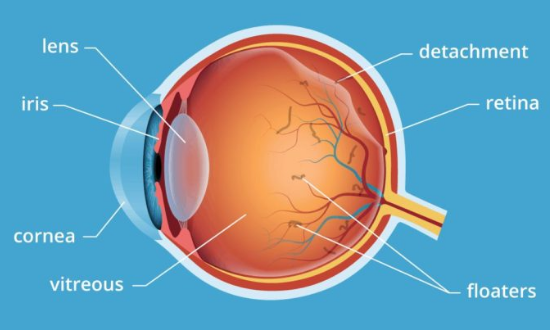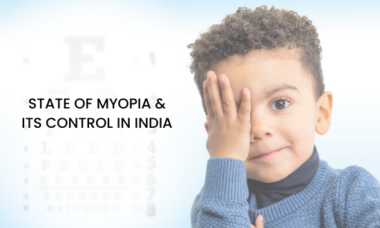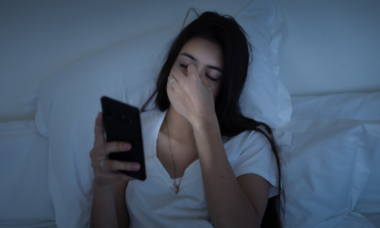Do you ever wonder what these black or grey strings-like or jelly-like or cobweb-like objects are, floating in front of the eyes?
Most of the time, our brain ignores this disturbance in the vision but every once in a while, staring at some distance many people happen to notice them.
If you too see them in your vision this blog will help you understand how much you need to pay attention to it.
What are these substances called?
These fiber-like strands are known as Floaters. Usually, you see them floating or swimming along with your vision and when you try to look at them they seem to move away. They feel like they are actually present in front of your eyes but in reality, they are present within your eyeballs.

80% of your eye is filled with Vitreous Humor. It is a translucent jelly-like blackish substance between the lens and the retina. Vitreous humor helps maintain the IntraOcular pressure of the eye. Along with that, it maintains the positioning of all the parts of the eye.

Why are they formed?
Due to the deposits of protein and blood cells for a long period of time, clumps are formed in the Vitreous Humour. Light traveling in the eye touches the retina to form the inverted image. When the floaters, present in the Vitreous Humour come in the path of light, they cast shadows on the retina. Thus we see these jelly-like Floaters in front of the eye.
Who is most likely to see Floaters?
- Most Myopic (Nearsightedness – ability to see near objects clearly but distance vision is blurred) patients are likely to notice Floaters.
- Also, people who have cataract surgery might witness Floaters in their eyes.
- Even Migraines or tumors can be a cause of Floaters
- It could be due to side effects of the medicine
- Or simply the aging effect
Should Floaters ring alarms?
In most cases, Floaters don’t always mean harm-alarm. This naturally happens with age in the human eye. Although, if you happen to notice a sudden increase in the visibility of Floaters then you must visit your eye doctor immediately. This could be an indication of:
- Swelling in the posterior part of the eye
- Retinal detachment
- Torn retina
- Shrinking of Vitreous Humour
How bad is Retinal Detachment?
The Retina is a thin film-like layer on the back of your eye. To make it easier to understand Retinal detachment, consider it as a screen guard on your mobile screen. Over time you may have noticed a little bubble at the edge of your mobile screen guard which grows over time. Eventually, your screen guard peels off the screen. Similar is retinal detachment. It starts from a bubble and if not treated can lead to complete retinal detachment. Without the retina, an image cannot be formed and hence it can lead to complete loss of vision. Retinal detachment is a serious condition of the eye and needs urgent and appropriate treatment.
Do I need to visit a Doctor?
If you are witnessing any of the below-mentioned symptoms, you need to think about paying your Doctor a visit.
- Increase in Floaters
- Increase in Flashes
- Dull or spotted or greyish peripheral vision
- Part of your vision is spotted or dull
- If floaters are continuously disturbing your vision causing discomfort
- Blood clots in your eyes
Are Floaters curable?
Well, conditions that cannot be cured can surely be operated. Operating your eyes involves risk. Unless really required and suggested by a Doctor, Why should you risk your vision? Floaters can simply be ignored as long as you don’t notice them increasing.
Vitrectomy is surgery performed to remove Floaters. In this procedure, Vitreous Humour is removed and replaced by a gel solution which your eye replaces by producing more Vitreous Humour. Although, there is no guarantee that floaters will not be formed again. There are fair chances of getting them back. Only in cases where floaters are densely present, this surgery is recommended by doctors.
Laser therapy targets high-frequency waves onto the Floaters causing them to break. Yet, there are cases where people have complained of little or no improvement. These kinds of therapies also have their own potential threats.
How to prevent Floaters?
The best way to keep Floaters or any other eye problems at bay is by maintaining healthy food habits.
- Include food like orange, lemon, and other citrus fruits or foods containing Omega-3 fatty acids.
- Drink at least two liters of water a day.
- Avoid exposing the naked eyes to the Sun to avoid macular degeneration. Must wear good quality UV protective sunglasses or spectacles.
- Avoid gawking at the screen for long hours to avoid causing damage to your Macula. Blue light filtering lenses are a good buy!
- Do eye exercises to strengthen the muscles holding your eye.
Click here to know more about blue light, its effect, and prevention.









2 comments
Excellent
Thank you, Mr. Dilip!